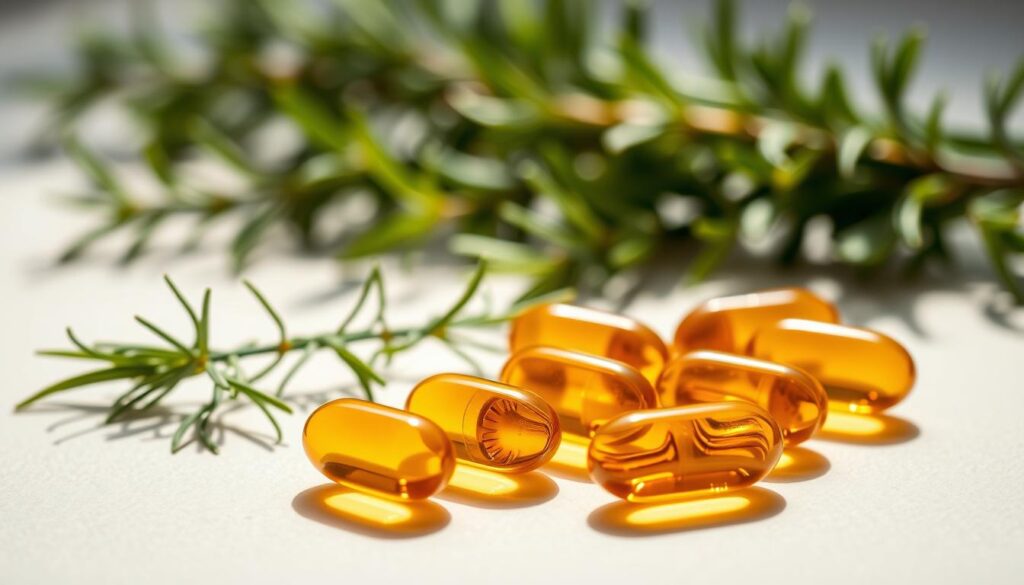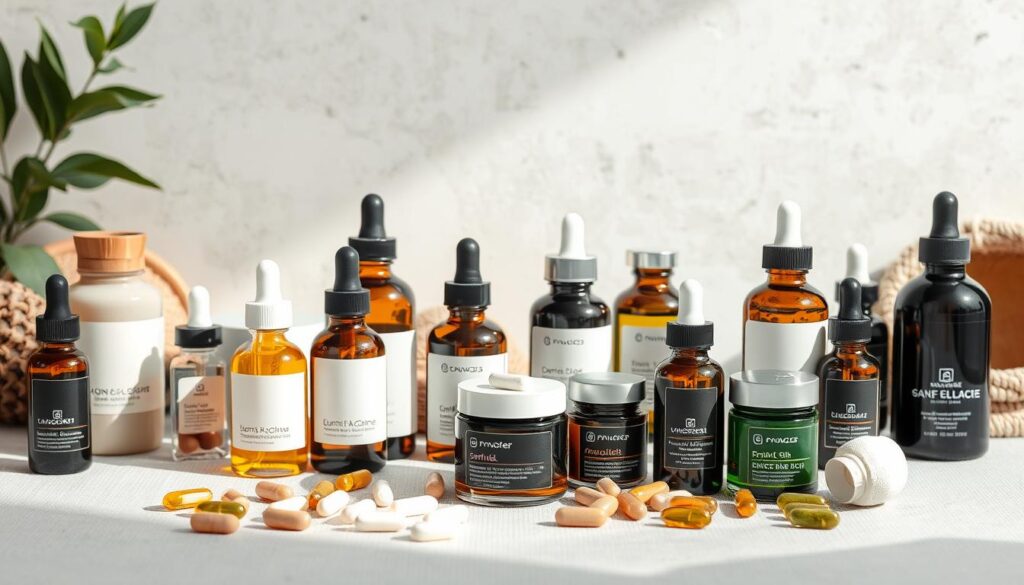
Supplements That Are Good For Your Skin: Expert Picks for Clearer Skin
Contents
- 1 The Connection Between Nutrition and Skin Health
- 2 Understanding the Science Behind Skin Supplements
- 3 Supplements That Are Good For Your Skin: A Comprehensive Overview
- 4 Collagen Supplements: The Foundation of Skin Structure
- 5 Vitamin C and E: The Brightening and Protective Powerhouses
- 6 Omega-3 Fatty Acids: Essential Nutrients for Skin Barrier Function
- 7 Zinc, Selenium, and Vitamin A: Powerful Allies Against Acne
- 8 Specialized Supplements for Specific Skin Concerns
- 9 Creating a Holistic Approach: Supplements and Skincare
- 10 Conclusion: Building Your Personalized Skin Supplement Regimen
Achieving clearer skin is not just about using the right skincare products; it’s also about nourishing your body from the inside out. Skin health nutrition plays a crucial role in maintaining a radiant and healthy complexion.
With so many skin supplements available, it can be overwhelming to choose the right ones. That’s why we’ve consulted with experts to bring you the best supplements for skin health that can help you achieve your skin goals.
In this article, we’ll explore the top supplements that can help improve your skin’s health and appearance, giving you a clearer and more radiant complexion.
The Connection Between Nutrition and Skin Health
A well-balanced diet is essential for achieving and maintaining healthy, glowing skin. The food we consume provides our skin with the necessary nutrients to function properly, repair damage, and maintain its youthful appearance.
How Your Diet Affects Your Complexion
The nutrients we obtain from our diet play a crucial role in supporting skin health. For instance, vitamins C and E are known for their antioxidant properties, which help protect the skin from damage caused by free radicals. A diet rich in fruits, vegetables, and whole grains can provide these essential nutrients. On the other hand, a diet high in processed foods and sugars can lead to inflammation and exacerbate skin issues like acne.
Identifying Common Nutritional Gaps Affecting Skin
Many individuals have nutritional gaps that can affect their skin health. Common deficiencies include a lack of omega-3 fatty acids, vitamin D, and zinc. For more information on how to address these deficiencies, you can visit Nuvectra Medical for expert advice.
Signs Your Skin Needs Nutritional Support
If you’re experiencing persistent skin issues such as dryness, dullness, or acne, it may be a sign that your skin needs additional nutritional support. Paying attention to these signs and adjusting your diet accordingly can make a significant difference. Incorporating nutrient-dense foods and considering supplements when necessary can help support skin health.
Understanding the Science Behind Skin Supplements
To truly grasp the impact of skin supplements, it’s essential to explore the science that governs their operation within the body. Skin supplements are designed to support skin health from the inside out, utilizing nutrients that target various aspects of skin wellness.
How Supplements Work from the Inside Out
Skin supplements work by providing the body with essential nutrients that are vital for maintaining healthy skin. These nutrients can help to support the skin’s natural barrier function, improve hydration, and enhance overall skin elasticity. The key to their effectiveness lies in their ability to be absorbed and utilized by the body.
The Role of Antioxidants in Skin Protection
Antioxidants play a crucial role in protecting the skin from environmental stressors and damage caused by free radicals. By neutralizing these harmful agents, antioxidants help to preserve skin health and reduce the visible signs of aging. Common antioxidants used in skin supplements include vitamins C and E, as well as other potent compounds like astaxanthin.
Bioavailability: Why It Matters for Skin Supplements
Bioavailability refers to the extent to which the body can absorb and utilize the nutrients from supplements. A high bioavailability is crucial for the effectiveness of skin supplements, as it ensures that the active ingredients are properly absorbed and utilized. Factors such as the formulation of the supplement and the presence of other nutrients can influence bioavailability.
| Factor | Impact on Bioavailability | Example |
|---|---|---|
| Formulation | The way a supplement is formulated can significantly affect how well its nutrients are absorbed. | Liposomal delivery systems can enhance the bioavailability of certain nutrients. |
| Presence of Other Nutrients | Certain nutrients can enhance or inhibit the absorption of others. | Vitamin C can enhance the absorption of iron. |
| Digestive Health | The state of one’s digestive health can impact the body’s ability to absorb nutrients from supplements. | A healthy gut microbiome is essential for optimal nutrient absorption. |
Supplements That Are Good For Your Skin: A Comprehensive Overview
Achieving healthy, glowing skin involves more than just topical treatments; it requires a comprehensive approach that includes the right supplements. With numerous options available, understanding the different categories and what constitutes quality formulations is essential for making informed decisions.
Categories of Skin-Supporting Supplements
Skin supplements can be broadly categorized into several key groups, each offering unique benefits. Collagen supplements, for instance, are renowned for their role in improving skin elasticity and reducing wrinkles. Vitamin C and E supplements are another crucial category, known for their antioxidant properties that protect the skin from environmental stressors and promote collagen production.
Other notable categories include omega-3 fatty acids, which help in maintaining the skin’s barrier function and reducing inflammation, and probiotics, which support the skin microbiome. Understanding these categories can help individuals choose the supplements that best suit their skin concerns.
What Dermatologists Look for in Quality Formulations
Dermatologists emphasize the importance of quality when it comes to skin supplements. Key factors include the bioavailability of ingredients, the presence of clinically-tested components, and the absence of harmful additives. Third-party testing is also a critical factor, as it ensures the supplement’s purity and potency.
Supplement Forms: Pills vs. Powders vs. Liquids
Skin supplements come in various forms, each with its advantages. Pills are convenient and easy to incorporate into a daily routine. Powders offer flexibility in dosing and can be easily mixed into beverages or foods. Liquids are often more bioavailable and can be absorbed more quickly by the body.
Choosing the right form depends on individual preferences and needs. For instance, those with digestive issues might prefer liquids for better absorption.
Collagen Supplements: The Foundation of Skin Structure
The quest for youthful, radiant skin has led many to explore the benefits of collagen supplements. Collagen, the most abundant protein in the human body, plays a crucial role in skin structure, providing strength, elasticity, and hydration.
Collagen supplements have gained popularity due to their potential to support skin health from the inside out. With various types available, it’s essential to understand their specific benefits and how they can address different skin concerns.
Types of Collagen Supplements and Their Specific Benefits
There are several types of collagen supplements, each with unique benefits. The most common types include:
- Type I Collagen: Found predominantly in skin, this type is known for improving skin elasticity and reducing fine lines.
- Type II Collagen: Primarily found in cartilage, it’s often used to support joint health.
- Type III Collagen: This type is associated with the production of elastin and fibrillin, supporting skin elasticity.
Research-Backed Results for Wrinkles and Elasticity
Numerous studies have demonstrated the efficacy of collagen supplements in improving skin elasticity and reducing wrinkles. Research has shown that collagen peptides can stimulate collagen production, leading to improved skin hydration and elasticity.
A study published in the Journal of Medicinal Food found that participants who took a collagen supplement experienced significant improvements in skin elasticity and hydration compared to those who received a placebo.
Expert-Recommended Brands and Dosages
When choosing a collagen supplement, it’s crucial to select a reputable brand that adheres to high-quality standards. Some expert-recommended brands include:
- NeoCell: Known for their high-quality collagen peptides.
- Vital Proteins: Offers a range of collagen products, including collagen peptides and multi-collagen blends.
The recommended dosage varies, but most studies suggest taking between 5-10 grams of collagen peptides per day. It’s essential to consult with a healthcare professional before starting any supplement regimen.
Vitamin C and E: The Brightening and Protective Powerhouses
Unlocking the potential of vitamins C and E can revolutionize your skincare routine. These two vitamins are renowned for their antioxidant properties and their significant impact on skin health.
How These Vitamins Support Collagen Production
Vitamin C, in particular, is crucial for collagen synthesis. It acts as a co-factor for the enzymes prolyl hydroxylase and lysyl hydroxylase, which are essential for stabilizing and cross-linking collagen molecules. Vitamin C’s role in collagen production helps maintain skin elasticity and firmness, reducing the appearance of fine lines and wrinkles.
Vitamin E also supports skin health by protecting cell membranes from damage caused by free radicals, thereby indirectly supporting the integrity of skin structure.
Benefits for Hyperpigmentation and Environmental Damage
Vitamins C and E are both known for their ability to combat hyperpigmentation and protect against environmental stressors. Vitamin C inhibits melanin production, helping to reduce the appearance of dark spots and hyperpigmentation. Meanwhile, vitamin E neutralizes free radicals, which can cause skin damage and discoloration.
Together, these vitamins offer a dual defense against environmental damage, such as pollution and UV exposure, which can lead to premature aging.
Synergistic Effects When Combined with Other Supplements
The combination of vitamins C and E with other supplements can enhance their effectiveness. For instance, when paired with vitamin C, vitamin E can become more stable and effective in protecting the skin.
Optimal Timing and Absorption Strategies
For optimal absorption, consider taking vitamin C in the morning, as it can help protect the skin from daily environmental stressors. Vitamin E can be taken at any time, but its absorption is enhanced when consumed with a meal containing fat.
| Vitamin | Benefits | Best Practices |
|---|---|---|
| Vitamin C | Boosts collagen production, reduces hyperpigmentation | Take in the morning, can be consumed with or without food |
| Vitamin E | Protects against environmental damage, supports skin health | Take with a fatty meal for better absorption |
Omega-3 Fatty Acids: Essential Nutrients for Skin Barrier Function
Omega-3s are not just good for the heart; they’re also vital for skin health. These essential fatty acids play a significant role in maintaining the skin’s barrier function, reducing inflammation, and promoting overall skin well-being.
How Omega-3s Combat Inflammation and Dryness
Omega-3 fatty acids, particularly EPA and DHA, have potent anti-inflammatory properties that help in reducing skin inflammation and dryness. They achieve this by modulating the body’s inflammatory response and improving the skin’s ability to retain moisture.
Reducing inflammation is crucial for managing skin conditions like acne and rosacea. Omega-3s also support the skin’s natural barrier, enhancing its resilience against environmental stressors.

Sources: Fish Oil vs. Algae-Based Options
Omega-3 supplements come in two main forms: fish oil and algae-based. Fish oil is derived from fatty fish and is a traditional source of omega-3s. However, algae-based supplements, which are derived from algae that produce omega-3s, offer a vegan alternative that is equally effective.
Both sources have their benefits, with fish oil being more commonly available and algae-based options catering to vegetarians and vegans.
Clinical Evidence for Eczema and Psoriasis Improvement
Numerous studies have demonstrated the benefits of omega-3 fatty acids in improving skin conditions such as eczema and psoriasis. These studies show that omega-3 supplementation can lead to reduced symptoms and improved quality of life for patients.
The anti-inflammatory effects of omega-3s help in alleviating the severity of these conditions, making them a valuable addition to treatment regimens.
Zinc, Selenium, and Vitamin A: Powerful Allies Against Acne
Zinc, selenium, and vitamin A are not just beneficial for overall health; they play a significant role in combating acne and promoting healthier skin. These nutrients work synergistically to regulate oil production, reduce inflammation, and enhance the skin’s natural barrier function.
The Science Behind These Minerals for Oil Regulation
Zinc is renowned for its ability to control oil production and reduce the occurrence of acne. It achieves this by regulating the sebaceous glands, thereby preventing excessive oil secretion that can clog pores. Additionally, zinc’s anti-inflammatory properties help in reducing the redness and swelling associated with acne.
Selenium, an antioxidant, plays a crucial role in protecting the skin from oxidative stress, which can exacerbate acne. By neutralizing free radicals, selenium helps maintain the integrity of skin cells, promoting a healthier complexion.
Vitamin A and its derivatives are well-documented for their effectiveness in treating acne. They work by preventing the clogging of pores and promoting cell turnover, which helps in reducing the appearance of acne and preventing future breakouts. For more insights on how specific nutrients can impact skin health, you can explore resources like supplement reviews.
Dermatologist-Recommended Formulations for Breakout-Prone Skin
Dermatologists often recommend formulations that combine these nutrients for their synergistic benefits. For instance, a supplement that includes zinc, selenium, and vitamin A can provide comprehensive support against acne by addressing multiple factors that contribute to its development.
Safe Supplementation Guidelines and Potential Interactions
While these nutrients are beneficial, it’s essential to follow safe supplementation guidelines. The recommended daily intake of zinc is around 15mg for adults, selenium is 55mcg, and vitamin A is 700-900mcg. Exceeding these doses can lead to adverse effects. Moreover, individuals should be aware of potential interactions with other medications or supplements. For example, zinc can interact with certain antibiotics, reducing their effectiveness.
In conclusion, zinc, selenium, and vitamin A are powerful allies in the fight against acne. By understanding their roles and incorporating them into a comprehensive skincare regimen, individuals can better manage acne and promote healthier, clearer skin.
Specialized Supplements for Specific Skin Concerns
Beyond general skin health, certain supplements are designed to tackle specific skin concerns, providing a more tailored solution. These specialized supplements can address a range of issues, from hydration and aging to acne and sensitivity.
Hyaluronic Acid and Ceramides for Hydration and Plumping
Hyaluronic acid is renowned for its ability to retain moisture, making it an excellent supplement for enhancing skin hydration and plumpness. Ceramides, on the other hand, support the skin’s barrier function, improving its resilience against environmental stressors.
Benefits: Improved hydration, enhanced skin elasticity, and a more youthful appearance.
Niacinamide for Pore Refinement and Redness Reduction
Niacinamide has been shown to improve the appearance of pores and reduce redness, making it a valuable supplement for those with acne-prone or sensitive skin. Its anti-inflammatory properties also help in achieving a more even skin tone.
- Minimizes pore size
- Reduces inflammation and redness
- Improves skin’s barrier function
Astaxanthin and Other Potent Antioxidants for Anti-Aging
Astaxanthin, a powerful antioxidant derived from microalgae, has been shown to protect the skin from oxidative stress, reducing the appearance of fine lines and wrinkles. Other antioxidants like vitamin C and E also play crucial roles in combating aging.
Astaxanthin’s unique ability to span the cell membrane provides comprehensive protection against oxidative damage.
Probiotics and Prebiotics for Skin Microbiome Support
The skin microbiome is crucial for maintaining healthy skin. Probiotics and prebiotics can support this delicate balance, potentially reducing issues like acne, rosacea, and sensitivity.
| Supplement | Benefit | Targeted Skin Concern |
|---|---|---|
| Hyaluronic Acid | Hydration, plumping | Dryness, fine lines |
| Niacinamide | Pore refinement, redness reduction | Acne, sensitivity |
| Astaxanthin | Antioxidant, anti-aging | Fine lines, wrinkles |
| Probiotics/Prebiotics | Skin microbiome support | Acne, rosacea, sensitivity |

By incorporating these specialized supplements into one’s regimen, individuals can address specific skin concerns more effectively, leading to a more radiant and healthy complexion.
Creating a Holistic Approach: Supplements and Skincare
A holistic skincare strategy that incorporates supplements, topical treatments, and healthy lifestyle choices can significantly enhance skin health. By combining these elements, individuals can address various skin concerns more effectively.
Timeline Expectations: When to See Results
When incorporating supplements into your skincare routine, it’s essential to have realistic expectations about when to see results. Generally, it can take anywhere from 30 to 90 days to notice significant improvements in skin health. This timeline can vary depending on individual factors such as skin type, the specific supplement used, and overall health.
Pairing Supplements with Topical Treatments
To maximize the benefits of supplements, pairing them with appropriate topical treatments can enhance their efficacy. For instance, using a collagen supplement in conjunction with a topical vitamin C serum can boost collagen production and improve skin elasticity.
Some key considerations when pairing supplements with topical treatments include:
- Understanding the active ingredients in both your supplements and topical products
- Ensuring that the combination is synergistic and enhances the benefits of both
- Being mindful of potential interactions or sensitivities
Lifestyle Factors That Enhance Supplement Efficacy
Lifestyle factors play a crucial role in the effectiveness of skincare supplements. Maintaining a balanced diet rich in fruits, vegetables, and healthy fats supports skin health. Additionally, staying hydrated, managing stress through practices like meditation or yoga, and getting adequate sleep can all contribute to healthier, more resilient skin.
Key lifestyle adjustments include:
- Adopting a nutrient-dense diet
- Staying hydrated by drinking plenty of water
- Engaging in regular physical activity
- Managing stress levels
- Getting sufficient sleep each night
Conclusion: Building Your Personalized Skin Supplement Regimen
Building a personalized skin supplement regimen involves understanding your skin type, identifying nutritional gaps, and selecting supplements that address specific skin concerns. By incorporating the right supplements into your daily supplement routine, you can enhance your skin’s health and appearance. It’s essential to consult with a healthcare professional before starting any new supplements to ensure they align with your overall health and skincare goals.
By combining a well-chosen supplement regimen with a consistent skincare routine and a healthy lifestyle, you can achieve clearer, healthier-looking skin. Remember, patience is key, as the benefits of supplements can take time to become apparent. With the right approach, you can unlock the full potential of supplements to support your skin health journey.